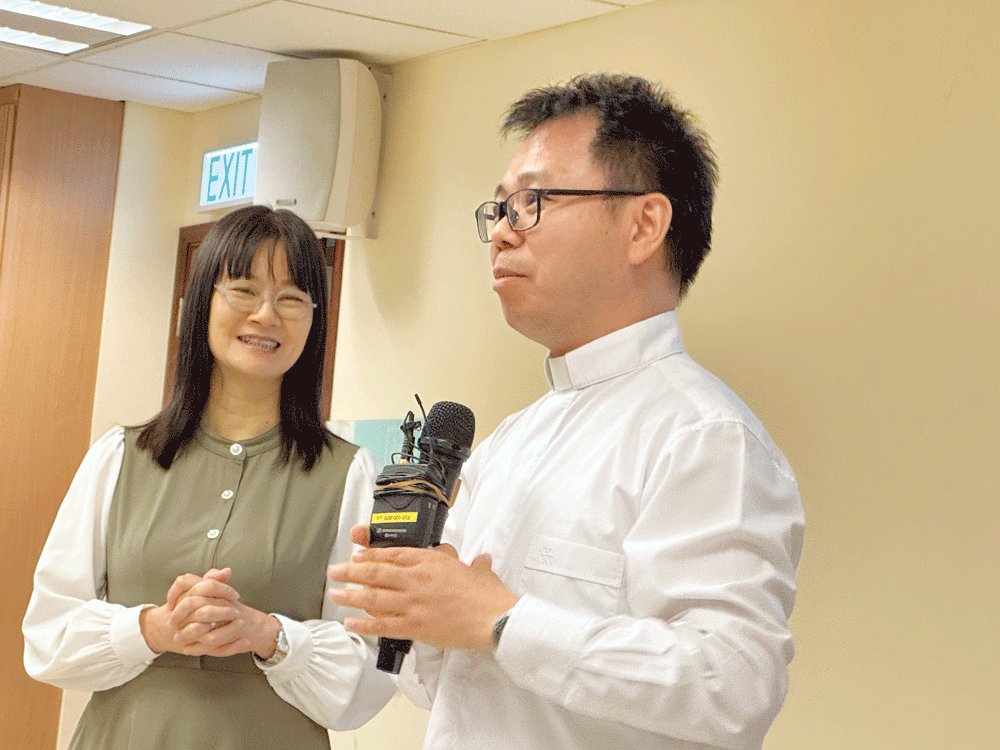
HONG KONG (SE): The Diocesan Commission for Marriage and the Family hosted a special talk on the Theology of the Body and healing for the divorced and separated at the Holy Cross Centre, Sai Wan Ho, on June 23.
The event, led by Andrew Kong from Singapore, focused on offering pastoral care, theological reflection, and spiritual support to individuals affected by marital breakdowns.
The session began with a moving testimony by pastoral officer, Catherine Cheung, who shared her personal experience following her separation 10 years ago. Living overseas with three children, Cheung recalled feelings of isolation and anger. She later found hope and healing through the Cana Hope Community and a retreat that helped her begin restoring the emotional damage caused by her broken family.
She reassured attendees of the Church’s compassionate presence, likening herself and others in similar situations to Kintsugi vases—cracked but made beautiful through God’s grace.

Andrew Kong, drawing from the teachings of St. John Paul II’s Theology of the Body, presented a rich theological framework for understanding human dignity, sexuality, and love. He emphasised the body as a visible sign of God’s invisible love and highlighted marriage as a sacred covenant rooted in scripture—from Adam and Eve to Christ as the bridegroom in the New Testament.
Kong outlined the four key characteristics of authentic love: free, total, faithful, and fruitful—qualities essential to the sacrament of marriage. Addressing the painful reality of divorce, he cited Matthew 19:9, underlining the Church’s view of marriage as indissoluble. He explained that while the Church prefers the term “separated” over “divorced,” its pastoral concern is for healing, not exclusion.
Addressing the painful reality of divorce, he cited Matthew 19:9, underlining the Church’s view of marriage as indissoluble. He explained that while the Church prefers the term “separated” over “divorced,” its pastoral concern is for healing, not exclusion
Kong discussed the role of forgiveness, spiritual accompaniment, and divine grace in healing the wounds of separation. He explained the process of declaring a marriage null—acknowledging that while this avenue brings justice to some, it is not always accessible or applicable.
For those unable to remarry in the Church, Kong proposed the path of “married celibacy”—a conscious choice to live celibately while remaining canonically married. He described this as an invitation to become “spouses for the kingdom of God,” echoing Christ’s words in Matthew 19:12 about being “eunuchs for the sake of the kingdom.”
Far from being a tragic outcome, Kong framed it as a unique opportunity for profound spiritual maturity and deeper communion with God through ministry and apostolate.
Kong also shared his own journey of transformation following his divorce, which led him to study canon law in Rome—a process that greatly enriched his spiritual life.
He clarified that divorced individuals who are not remarried are welcomed to receive the Eucharist and participate in parish ministries, in alignment with Pope Francis’ encouragement for pastoral inclusion
He clarified that divorced individuals who are not remarried are welcomed to receive the Eucharist and participate in parish ministries, in alignment with Pope Francis’ encouragement for pastoral inclusion.
The session concluded with a prayer led by Dominican Father Hyacinth He Yousun, judicial vicar of the Diocesan Tribunal in Macau and defender of the bond in Hong Kong.
Father He said the canonical and pastoral implications of divorce and remarriage, reaffirming the Church’s openness to assisting those who long to return to full sacramental life.
While individuals who are divorced and civilly remarried—bound by a previous marriage bond—may not receive Holy Communion or serve in liturgical ministries, Father He emphasised they are still welcome to serve in other capacities such as music or charitable outreach. He urged those in complex marital situations to seek assistance through their parish priests.
He stressed that nullifying a marriage is not easy, as substantial evidence is required to safeguard the sanctity of marriage. However, he noted that many cases—especially those involving coercion, immaturity, lack of consent, lack of canonical form and impediment—can result in a declaration of nullity.
Father He emphasised they are still welcome to serve in other capacities such as music or charitable outreach. He urged those in complex marital situations to seek assistance through their parish priests
“The Church recognises that some individuals—especially those forced into divorce—are innocent and deserve our care and support,” he said.
Father He noted, “The salvation of souls is our greatest aspiration. We want everyone to receive Holy Communion and live a full life in the Church.”
Catechist Cecilia Sin told Sunday Examiner that her motivation for attending the talk was to better guide the younger generation. “We live in a world that increasingly disregards the sanctity of the body and marriage,” she said. “As a catechist, I want to be well-equipped to pass on the truth of the Church’s teachings with both clarity and compassion.”










